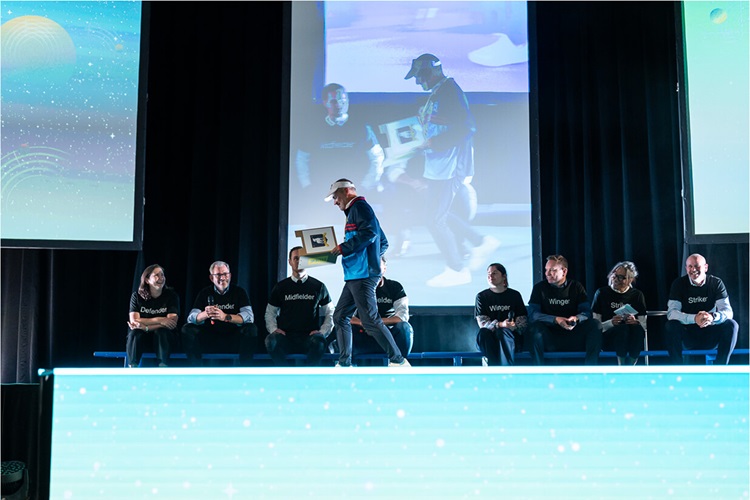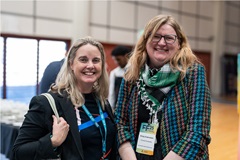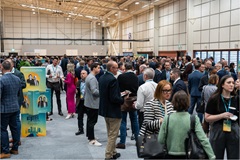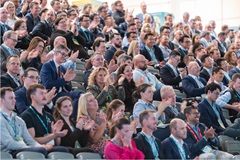August 2025
Foundations and Frontiers 2025: From Me to We

It’s half-time. Construction is three–nil down. How do we turn this game around? Enter Ted Lasso – in this case, Australian Constructors CEO Jon Davies with an inspirational locker-room address.
On 6 August 2025, more than 550 leaders from government, industry unions and academia gathered at Brisbane’s Nissan Arena for the Foundations and Frontiers (FF25) forum, hosted by the Australian Constructors Association (ACA).
“I
know what the scoreboard says and it’s not exactly whispering sweet nothings to us right now,” Jon Davies said.
“But you know what? The scoreboard doesn’t know us. Doesn’t know the
grit in our guts, the fire in our bellies, or the love we’ve got for this game or each other,” Jon said.
Knockout speakers, knockout sessions
With the theme ‘From Me to We’, FF25 began with a retrospective on the past 12 months, spotlighting landmark initiatives such as the National Construction
Strategy, Industry Blueprint and Culture Standard.
The Knockout Session, inspired by candid ACA Boardroom discussions, asked the question: Are we seeing real change where it matters most?
John Flecker, Global
CEO of Multiplex, likened the construction industry to the Wallabies: “To move from survival mode to success, we need consistency in the big matches – our major projects – and to start addressing the issues everyone knows exist.”
He asked whether it was time to be brave and call a time-out on unsustainable projects.
Bede Noonan, CEO of Acciona, argued for an offensive mindset: “We’re stuck in defensive or survival mode, managing risk
in a changing environment. But no one ever wins a championship by staying in their own half. To grow productivity and reduce costs, we must create space for innovation – collaborative contracts, shared data, better planning. That’s how
you score points.”
Annabel Crookes, President of ACA and Director of Laing O’Rourke, warned that a race to the bottom is a race where nobody wins. Drawing on a school sports analogy, she called for contract
models that reward collective performance, likening collaboration to a three-legged race: “We need to align interests and incentivise teamwork, not pit each other against one another in a construction version of the Hunger Games.”
Ross Greenwood, Business Editor at SkyNews, posed a challenge: “Is Australia the greatest place on earth?” His message? Look beyond our borders, benchmark against the best and strive to do better. “If this country does better,
we all prosper into the future.”



Seeing through each other’s eyes
Fresh from Jon Davies’ pep talk, participants jumped into a high-energy, industry-themed Family Feud: Contractors vs. Supply Chain, and
Designers vs. Clients. This was more than entertainment. It was a powerful reminder of the value in understanding challenges from every perspective. Debates revealed the biggest levers for boosting productivity: procurement reform, industrial relations,
clearer client specifications and smarter technology adoption.
The FF25 Leaders’ Exchange, held behind closed doors on the eve of FF25, brought together 120 of the nation’s most senior decision-makers to explore practical reforms
to close the industry’s long-standing productivity gap. Drawing on research by Oxford Economics, participants explored three scenarios that together reveal a multi-billion-dollar productivity prize:
- Scenario 1: Cutting indirect costs by just 10% could save the industry $5.7 billion annually.
- Scenario 2: Halving tender costs for bidders and reallocating resources to project delivery could generate $743 million in additional work and return $2.1 billion to the economy.
- Scenario 3: A more flexible RDO system could unlock $2.3 billion in additional work, driving a $7.3 billion economic boost.
With these scenarios fresh in the audiences’ minds, Consult Australia CEO Jonathan Cartledge delivered a rapid-fire ‘90-second pitch’, back by popular demand. This highlighted three industry challenges
and a double-shot solution. The challenges? Procurement: “the most adversarial construction environment in the world”. Productivity: “in a world of AI, we’re still printing PDFs”. And people: retaining the best
in an industry that burns them out.
Jonathan’s double silver bullet? Unravel risk by shifting to partnerships and collaborative contracting, and ‘go digital by default’ with modern tools from day one.
Later,
in the ‘speed bargaining’ session, contractors Michael Degotardi and Alanna Herbst negotiated an Olympic enterprise bargaining agreement on behalf of workers. Union leaders Michael Wright (ETU)
and Chris Donovan (AWU) took the contractor’s seat. The outcome? No conflict, just powerful insights. Walking in another’s shoes revealed that industrial relations isn’t a side issue. It’s central
to project success.
Global lessons for Brisbane 2032
The afternoon session opened with Sir David Higgins, former CEO of the London Olympic Infrastructure Delivery Agency. Drawing on his experience delivering London 2012, he offered a clear message: transparency is the foundation for
trust, resilience and delivery at scale.
Stephen Conry AM, Chair of the Games Independent Infrastructure and Coordination Authority (GIICA), followed with an urgent call: the next seven years are not a journey; they’re
a race. Delivering a world-class stadium will require unprecedented collaboration, innovation and speed.
ACA Vice Presidents Meg Redwin and Jason Spears delivered sharp closing remarks.
Meg challenged the gap between ambition and reality, urging the industry to replace the ‘Family Feud’ mindset with genuine understanding. Jason was blunt: “We keep talking about reform, but nothing changes. The solutions are known.
Now it’s time to act.”
“The fact that so many leaders made time to be in the room shows the appetite for change is real – and so is the responsibility,” reflected Jon Davies. “Now
we need aligned action to realise the full $60 billion prize.”
From Me to We isn’t just a theme. It’s a commitment.